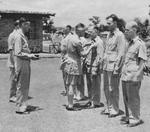Gordon Seagrave
| Surname | Seagrave |
| Given Name | Gordon |
| Born | 18 Mar 1897 |
| Died | 28 Mar 1965 |
| Country | Burma |
| Category | Medicine |
| Gender | Male |
Contributor: C. Peter Chen
ww2dbaseGordon Stifler Seagrave was born in Rangoon, Burma in 1897 to American Baptist missionaries Reverend Albert Ernest Seagrave and Alice Vinton. His first tongue was the Karen language rather than English. Following his parents' footsteps, he also became a missionary. In 1917, he graduated from Denison University in Granville, Ohio, United States. In 1920, he married Marion Grace "Tiny" Morse, with whom he would have four children. In 1921, he graduated with a medical degree from Johns Hopkins University in Baltimore, Maryland, United States. Returning to Burma, he practiced medicine near the border with China from 1922 to 1941. In 1941, he joined the US Army Medical Corps at the rank of major. During WW2, he was largely attached to the Chinese New 6th Army, treating the wounded in northern Burma and in India. He was promoted to the rank of colonel in 1943. After the war, he served as the chief medical officer for the Shan States of Burma with the British military government until 1946. He was arrested by agents of the now-independent Burma for assisting anti-government Karen rebels. Found guilty, he was sentenced to six years of hard labor in Jan 1951. He suffered from dysentery and malaria while in captivity. In Nov 1951, the Burmese Supreme Court overturned the decision, declaring him not guilty. He passed away at the hospital in Namhkam in northern Burma in 1965.
ww2dbaseSource: Wikipedia
Last Major Revision: Feb 2017
Photographs
 |  |
Gordon Seagrave Timeline
| 18 Mar 1897 | Gordon Seagrave was born in Rangoon, Burma. |
| 11 Sep 1920 | Gordon Seagrave married Marion Grace Morse in the United States. |
| 28 Mar 1965 | Gordon Seagrave passed away from heart disease in Namhkam, Shan State, Burma. |
Please consider supporting us on Patreon. Even $1 per month will go a long way! Thank you. Please help us spread the word: Stay updated with WW2DB: |
Visitor Submitted Comments
All visitor submitted comments are opinions of those making the submissions and do not reflect views of WW2DB.

- » Wreck of Teruzuki Found (27 Jul 2025)
- » USS Orlean's Bow Found (22 Jul 2025)
- » The Emperor of Japan Planned to Honor WW2-era Japanese POWs in Mongolia (4 Jul 2025)
- » US State Lawmaker John Winter Caught Using Racial Slur "Jap" and Apologized (11 Jun 2025)
- » US Government Plans to Purge WW2 Information (17 Mar 2025)
- » See all news
- » 1,182 biographies
- » 337 events
- » 45,131 timeline entries
- » 1,249 ships
- » 350 aircraft models
- » 207 vehicle models
- » 376 weapon models
- » 123 historical documents
- » 261 facilities
- » 471 book reviews
- » 28,431 photos
- » 365 maps
Joachim von Ribbentrop, German Foreign Minister, Aug 1939
23 Jun 2017 02:52:55 AM
re: Small Arms Category: Walther......You only list 1 Walther model, the P38. Which makes your web site topic coverage totally incomplete and insufficent. You need to add 2 more Walther Automatic Pistols, in common use during WWII by Luftwaffe and most officers in all three branches of service (Army, Navy, Airforce) the 2 models are.
1) Walther PPK 7.65mm
2) Walther PP (*don't get mislead by
name......PP= POLICE PISTOLE &
PPK POLICE PISTOLE KRIMINAL) as both of these semi-automatic pistols were manufactured for, inspected
by and issued to the military just as
the P-38 that you inappropriately chose to list as the sole Walther arm
issued by the German Military (Heeres). This is a glaring error of omission made by this website.
Respectfully,
M.A. Rosen, M.D.